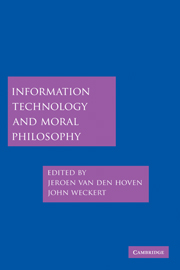Book contents
- Frontmatter
- Contents
- List of Contributors
- Introduction
- 1 Norbert Wiener and the Rise of Information Ethics
- 2 Why We Need Better Ethics for Emerging Technologies
- 3 Information Ethics: Its Nature and Scope
- 4 The Transformation of the Public Sphere: Political Authority, Communicative Freedom, and Internet Publics
- 5 Democracy and the Internet
- 6 The Social Epistemology of Blogging
- 7 Plural Selves and Relational Identity: Intimacy and Privacy Online
- 8 Identity and Information Technology
- 9 Trust, Reliance, and the Internet
- 10 Esteem, Identifiability, and the Internet
- 11 Culture and Global Networks: Hope for a Global Ethics?
- 12 Collective Responsibility and Information and Communication Technology
- 13 Computers as Surrogate Agents
- 14 Moral Philosophy, Information Technology, and Copyright: The Grokster Case
- 15 Information Technology, Privacy, and the Protection of Personal Data
- 16 Embodying Values in Technology: Theory and Practice
- 17 Information Technology Research Ethics
- 18 Distributive Justice and the Value of Information: A (Broadly) Rawlsian Approach
- Select Bibliography
- Index
- References
18 - Distributive Justice and the Value of Information: A (Broadly) Rawlsian Approach
Published online by Cambridge University Press: 21 July 2009
- Frontmatter
- Contents
- List of Contributors
- Introduction
- 1 Norbert Wiener and the Rise of Information Ethics
- 2 Why We Need Better Ethics for Emerging Technologies
- 3 Information Ethics: Its Nature and Scope
- 4 The Transformation of the Public Sphere: Political Authority, Communicative Freedom, and Internet Publics
- 5 Democracy and the Internet
- 6 The Social Epistemology of Blogging
- 7 Plural Selves and Relational Identity: Intimacy and Privacy Online
- 8 Identity and Information Technology
- 9 Trust, Reliance, and the Internet
- 10 Esteem, Identifiability, and the Internet
- 11 Culture and Global Networks: Hope for a Global Ethics?
- 12 Collective Responsibility and Information and Communication Technology
- 13 Computers as Surrogate Agents
- 14 Moral Philosophy, Information Technology, and Copyright: The Grokster Case
- 15 Information Technology, Privacy, and the Protection of Personal Data
- 16 Embodying Values in Technology: Theory and Practice
- 17 Information Technology Research Ethics
- 18 Distributive Justice and the Value of Information: A (Broadly) Rawlsian Approach
- Select Bibliography
- Index
- References
Summary
INTRODUCTION
Distributive justice in contemporary information societies concerns, among other issues, the distribution of information, information services, and information infrastructures. There is currently much enthusiasm about the potential of new information and communication technologies (ICTs), and the immense information resources contained on the World Wide Web, to improve the lives of those who have access to them. But at the same time, there is mounting concern over the uneven distribution of the new information wealth, both within nations and internationally. Some even fear that we may be heading for a regime of local and global ‘information-apartheid’ (Ratan 1995; Wresch 1996; Loader 1998; Schiller 1996), in which the ‘information-haves’ are segregated from the ‘information have-nots’.
A host of empirical research adds force to such concerns. According to a 2005 UNCTAD study (UNCTAD 2006) the digital divide in the first years of the twenty-first century between nations is still wide. A person in a high-income country is more than twenty-two times more likely to be an Internet user than one in a low-income nation. In a high-income country, Internet affordability relative to income is more than150 times better than in a low-income nation. Even in lower-middle-income countries, the cost of twenty hours of inferior Internet service is nearly one-third the average monthly income. In high-income countries the cost of Internet service is affordable for most households, although the report claims that, even within these countries, considerable digital divides continue to exist between urban and rural areas, genders, age groups, and racial groups.
- Type
- Chapter
- Information
- Information Technology and Moral Philosophy , pp. 376 - 396Publisher: Cambridge University PressPrint publication year: 2008
References
- 16
- Cited by



